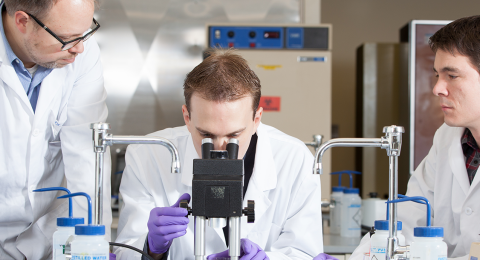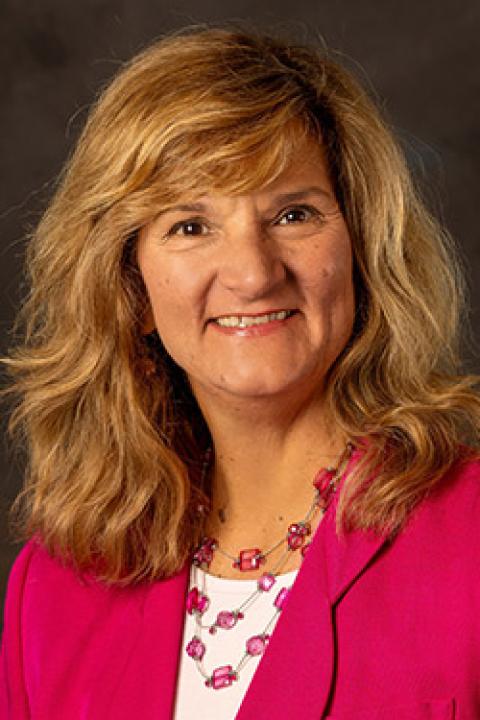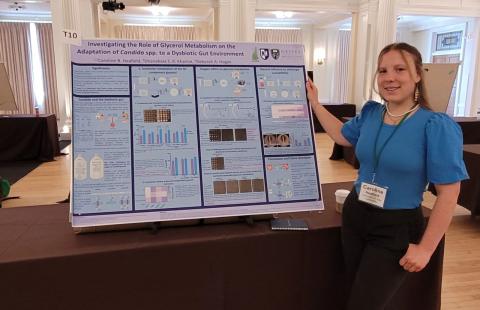Focus on either biology and microbiology as you pursue your associate degree in biological sciences at UNH Manchester
What is biological sciences?
Biology is the study of life, exploring how living organisms from microbes to animals to ecosystems interact with one another and the environment. It concerns itself with questions of understanding the living world, its complex interrelationships, and the role of human beings within it. The biological sciences program builds a foundation in topics like evolution, microbiology, molecular and cellular biology, biodiversity and more.
Why study biological sciences at UNH Manchester?
The Associate of Science in biological sciences at UNH Manchester is designed to prepare you with the skills and knowledge fora career or further education in the life sciences. Offering diverse areas of study and hands-on laboratory experience, this program explores microbiology, plant biology, biochemistry, zoology and more. The A.S. fulfills requirements that can go toward a bachelor’s degree in biological sciences or biotechnology at UNH Manchester. As a terminal degree, the A.S. can prepare you for careers in education; food, water, wastewater and other industrial laboratories; clinical laboratories; biotechnology; environmental research and monitoring; animal behavior and more.
Potential careers
- Dentist
- Doctor of Medicine
- Occupational or physical therapist
- Optometrist
- Pharmacist
- Physician assistant or pathologists’ assistant
- Professor
- Research technician
- Science teacher
- Veterinarian
Curriculum & Requirements
Biology is the study of living organisms in both laboratory and field conditions. It concerns itself with questions of understanding the living world, its complex interrelationships, and the role of human beings within it.
The associate of science in biological sciences program at UNH Manchester is designed to serve either as a terminal degree or as a springboard for students interested in the life sciences, which include majors in biology, biotechnology, microbiology, zoology, plant biology, wildlife management, environmental conservation, biochemistry, and animal sciences. Employment opportunities in the public and private sectors include education; food, water, wastewater and other industrial laboratories; clinical laboratories; biotechnology; environmental research and monitoring; and health careers.
For more information, contact the Office of Admissions, (603) 641-4150.
This degree plan is a sample and does not reflect the impact of transfer credit or current course offerings. UNH Manchester undergraduate students will develop individual academic plans with their professional advisor during the first year at UNH.
Sample Course Sequence
| First Year | ||
|---|---|---|
| Fall | Credits | |
| UMST 401 or UMST 402 | First Year Seminar or Transfer Seminar | 1-2 |
| ENGL 401 | First-Year Writing | 4 |
| BIOL 413 | Principles of Biology I | 4 |
| CHEM 403 | General Chemistry I | 4 |
| Discovery Course | 4 | |
| Credits | 17-18 | |
| Spring | ||
| MATH 425 | Calculus I | 4 |
| BIOL 414 | Principles of Biology II | 4 |
| CHEM 404 | General Chemistry II | 4 |
| Discovery Course | 4 | |
| Credits | 16 | |
| Second Year | ||
| Fall | ||
| PSYC 402 | Statistics in Psychology | 4 |
| CHEM 545 & CHEM 546 | Organic Chemistry and Organic Chemistry Laboratory | 5 |
| BIOL 541W | Ecology | 4 |
| HUMA 411 or HUMA 412 | Humanities I or Humanities II | 4 |
| Credits | 17 | |
| Spring | ||
| BMCB 658 & BMCB 659 | General Biochemistry and General Biochemistry Lab | 5 |
| BMS 503 & BMS 504 | General Microbiology and General Microbiology Laboratory | 5 |
| GEN 604 | Principles of Genetics | 4 |
| Discovery Course | 4 | |
| Credits | 18 | |
| Total Credits | 68-69 | |
Degree Requirements
Major, Option, and Elective Requirements as indicated.
*Major GPA requirements as indicated.
Major Requirements
Students must complete a minimum of 64 credits to graduate. There are two tracks in the A.S. degree program at UNH Manchester: biology and microbiology.
Biology Track Requirements
| Code | Title | Credits |
|---|---|---|
| MATH 425 | Calculus I | 4 |
| or MATH 424B | Calculus for Life Sciences | |
| PSYC 402 | Statistics in Psychology 1 | 4 |
| BIOL 413 | Principles of Biology I | 4 |
| BIOL 414 | Principles of Biology II | 4 |
| CHEM 403 | General Chemistry I | 4 |
| CHEM 404 | General Chemistry II | 4 |
| BMS 503 & BMS 504 | General Microbiology and General Microbiology Laboratory | 5 |
| CHEM 545 & CHEM 546 | Organic Chemistry and Organic Chemistry Laboratory | 5 |
| BMCB 658 & BMCB 659 | General Biochemistry and General Biochemistry Lab | 5 |
| BIOL 541W | Ecology | 4 |
| GEN 604 | Principles of Genetics | 4 |
| Total Credits | 47 | |
- 1
Other statistics courses such as BIOL 528 Applied Biostatistics I or BUS 430 Introduction to Business Statistics may be used to satisfy this requirement.
Microbiology Track Requirements
Students opting for the microbiology track must complete all courses listed in the biological sciences program with the exception of BIOL 541W Ecology. In addition, students must complete the following courses. From time to time, other microbiology courses may be offered. With approval of the Program Coordinator, they may substitute for courses within the Microbiology Track.
| Code | Title | Credits |
|---|---|---|
| BMS 602 & BMS 603 | Pathogenic Microbiology and Pathogenic Microbiology Laboratory | 5 |
| Total Credits | 5 | |
Note: Students preparing for professional or graduate programs may need to complete: CHEM 651 Organic Chemistry I/CHEM 653 Organic Chemistry Laboratory and CHEM 652 Organic Chemistry II/CHEM 654 Organic Chemistry Laboratory. These courses may substitute for CHEM 545 Organic Chemistry/CHEM 546 Organic Chemistry Laboratory and BMCB 658 General Biochemistry/BMCB 659 General Biochemistry Lab. Please consult your academic advisor.
Program Learning Outcomes
A student successfully completing the Biological Sciences program will be able to:
- Understand the fundamentals of basic biological principles, concepts, and theories.
- Demonstrate the ability to evaluate, apply, and synthesize biological information and ideas.
- Be competent in basic biology and chemistry laboratory skills and with the use of common laboratory equipment and instrumentation.
- Demonstrate the ability to communicate technical information related to biological sciences related topics in scientific writing and oral presentations.
- Understand, analyze, and evaluate primary research literature involving biological sciences related topics.
- Understand and apply the process of the scientific method, including being able to formulate hypotheses, design and conduct experiments with adequate controls to test hypotheses, interpret and evaluate data, and draw conclusions.
- Gather, analyze, organize, evaluate, and present scientific data, including the use of technology to solve problems and communicate information.
- Demonstrate the ability to function as a member of a team.
- Compete effectively for entry-level employment and for admission to baccalaureate schools in their chosen area and be successful in these endeavors.
Explore Program Details
-
Associate ProfessorAssociate Professor of Biological Sciences and of BiotechnologyAffiliate Faculty Member, Hubbard Center for Genome StudiesEmail: Kyle.MacLea@unh.eduPhone: (603) 641-4129
-
Adjunct Faculty
Because of the popularity and size of our biological sciences program, we’ve more than doubled our laboratory space. You’ll get hands-on experience in our seven state-of-the-art laboratories: general biology, advanced biology, microbiology, general chemistry and organic chemistry, as well as the cell culture research lab and microbiology research lab.
Labs are stocked with the latest, cutting-edge equipment and are taught by residential faculty or experienced instructors, all of whom specialize in their discipline.
Our campus is in the heart of the region’s cultural, economic, entertainment and government activity — putting unlimited internship opportunities at your doorstep. We’ve partnered with local businesses to give you the real-world experience that sets you apart. Biological sciences majors have interned at many high-profile organizations in the area, including:
- Concord Hospital
- Elliott Hospital
- Manchester Water Works
- New Hampshire Audubon Society
- Normandeau Associates











